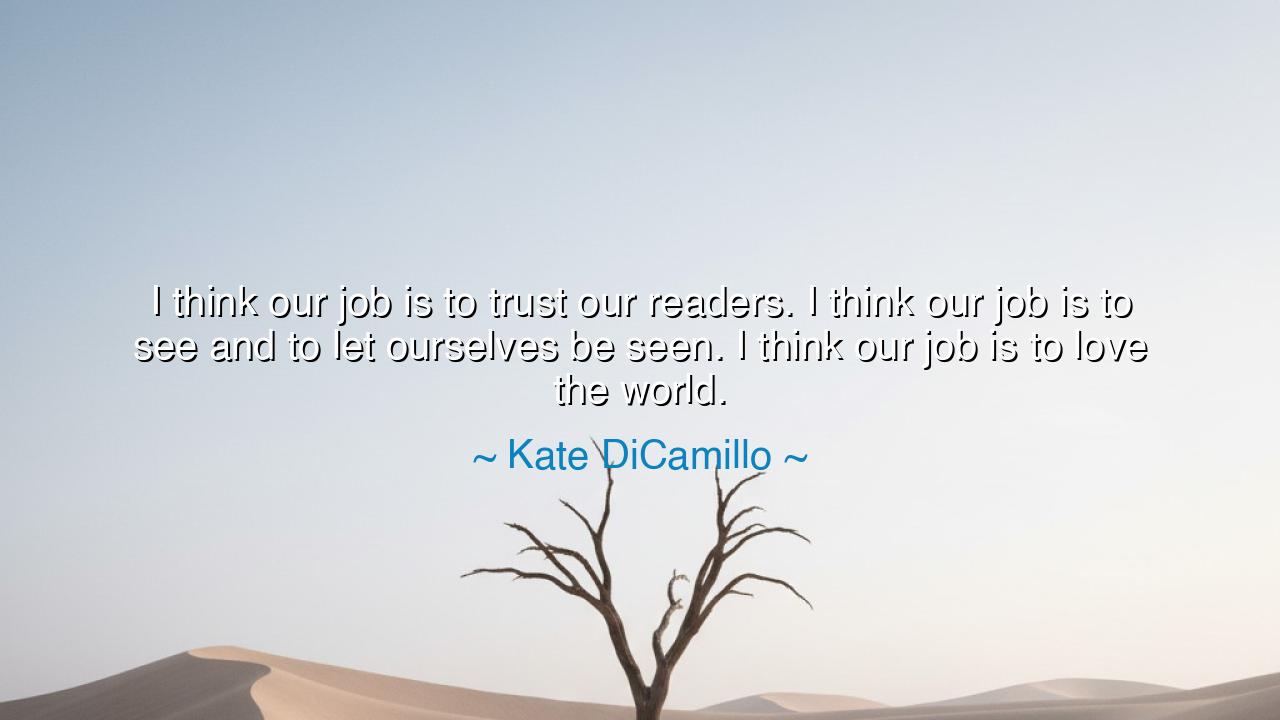
I think our job is to trust our readers. I think our job is to
I think our job is to trust our readers. I think our job is to see and to let ourselves be seen. I think our job is to love the world.






Hear the luminous voice of Kate DiCamillo, a weaver of tales for children and guardians of wonder: “I think our job is to trust our readers. I think our job is to see and to let ourselves be seen. I think our job is to love the world.” These words, though born in the quiet craft of storytelling, rise like a beacon for every soul who seeks to live authentically. They are not only the creed of a writer but the calling of all who would engage with others in truth, courage, and compassion.
The first charge is this: “to trust our readers.” In DiCamillo’s heart lies the belief that even children, perhaps especially children, deserve honesty. To write down to them, to hide sorrow or complexity, is to betray the dignity of their minds. To trust the reader is to recognize the spark of wisdom within every human being—that they can hold beauty and pain together, that they can walk with you through joy and grief. In this trust lies respect, and in respect lies the possibility of deep connection.
The second charge: “to see and to let ourselves be seen.” Here she speaks of vulnerability, the courage to reveal the truth of our humanity. A storyteller who hides behind masks writes without blood or soul; but one who reveals their heart, with all its cracks and scars, allows the reader to glimpse the universal within the personal. And just as the writer must allow themselves to be seen, so too must they learn to see their reader—to imagine their fears, their loneliness, their hopes. In this mutual gaze, art becomes communion.
The third charge, the greatest of all: “to love the world.” This does not mean to flatter the world or to ignore its brokenness, but to embrace it with tenderness. To love the world is to write stories that awaken compassion, to live in a way that acknowledges suffering yet still chooses hope. It is the work of prophets, poets, and teachers across the ages: to look upon humanity in all its flaws, and still to declare it worthy of love.
History bears witness to this. Consider the diaries of Anne Frank. In the midst of war, persecution, and confinement, she still wrote: “In spite of everything, I still believe that people are really good at heart.” Though she did not live to see peace, her words, born of honesty and trust, continue to see us, to show us her soul, and to remind us of the power of love. DiCamillo’s words are cut from the same cloth—they remind us that the act of storytelling, of living truthfully, is an act of loving the world against all odds.
The deeper wisdom here is that the tasks of trust, seeing, and loving are not limited to writers. They are the work of every human being. Parents must trust their children, leaders must trust their people, friends must trust one another. All must learn to see and be seen—not hiding behind falsehoods, nor judging with blindness. And all must strive to love the world, not as they wish it to be, but as it is, broken yet beautiful, flawed yet filled with divine spark.
The lesson for us is clear: if you would live fully, then live by this triad. Trust others. Let yourself be seen. Love the world. Do not withhold your truth out of fear, nor close your eyes to the truths of others. Let your words and actions flow from compassion. And know that even small acts—an honest conversation, a story told with courage, a kindness offered without expectation—become threads in the great fabric of trust and love that holds humanity together.
So I say to you, O seekers of tomorrow: remember Kate DiCamillo’s words. To trust is to honor. To see is to connect. To love is to redeem. Carry these duties as your own. For if you live this way, then whether you write books or not, your life itself will become a story worth reading—a story that teaches, heals, and reminds the world that love is the greatest work of all.






AAdministratorAdministrator
Welcome, honored guests. Please leave a comment, we will respond soon